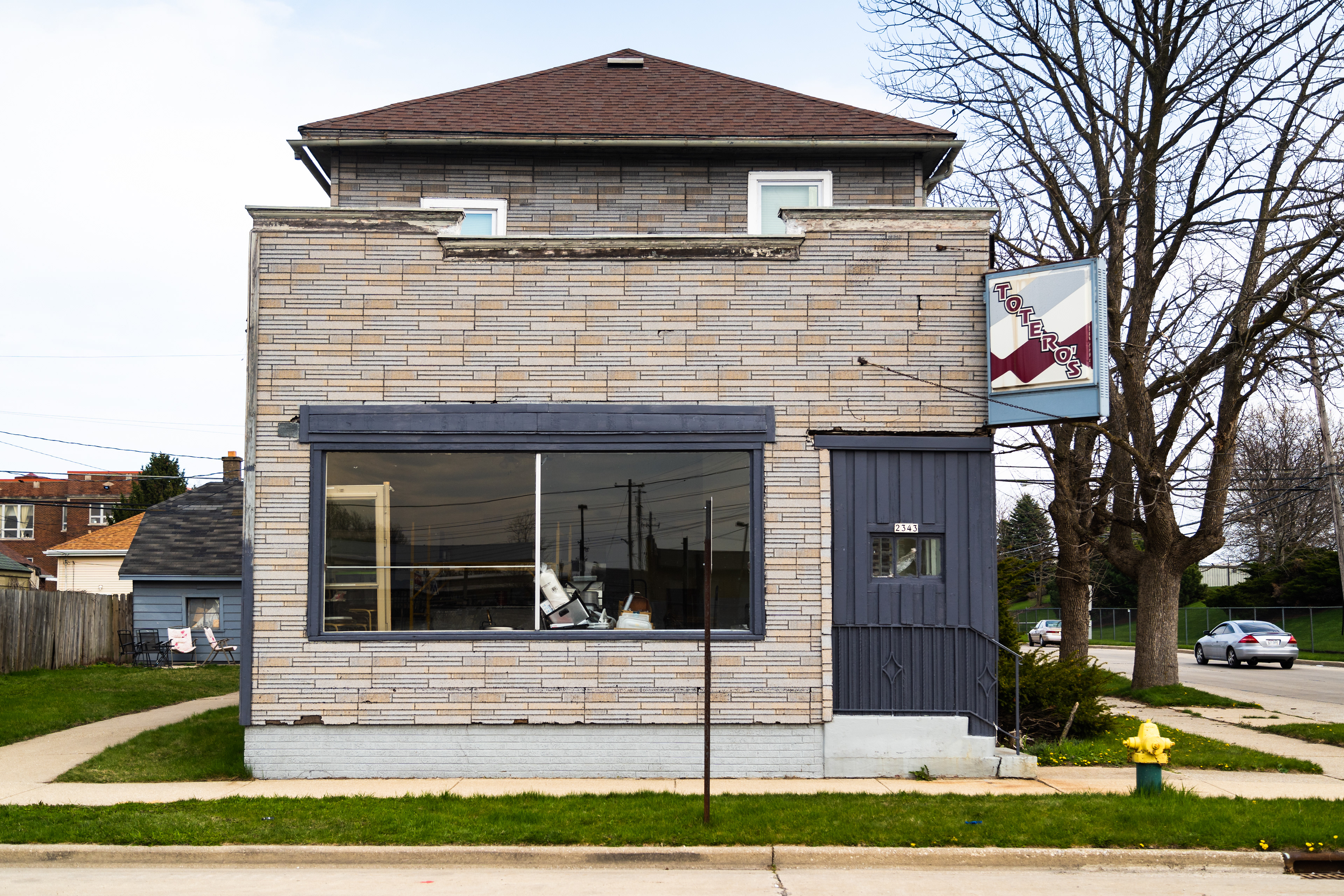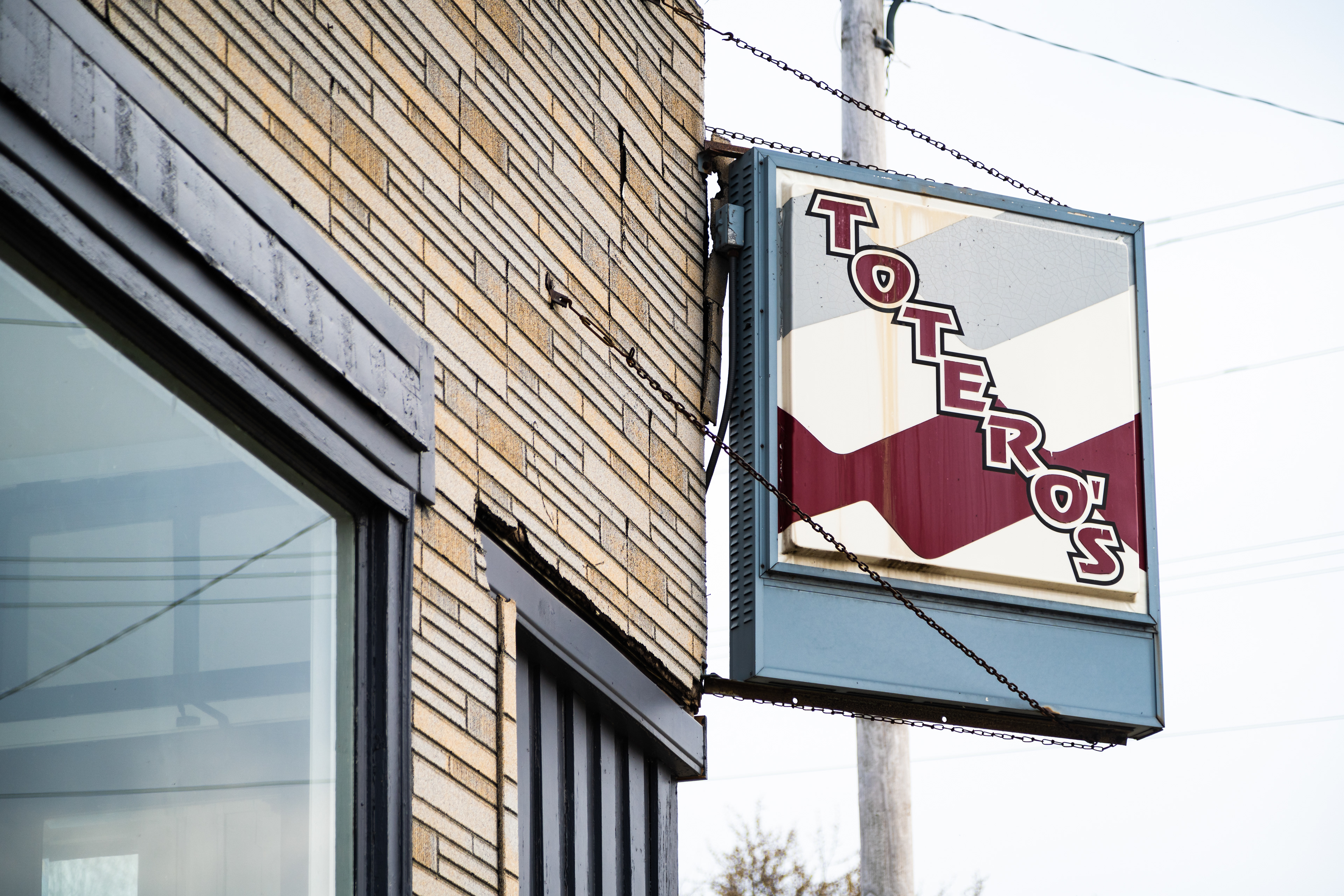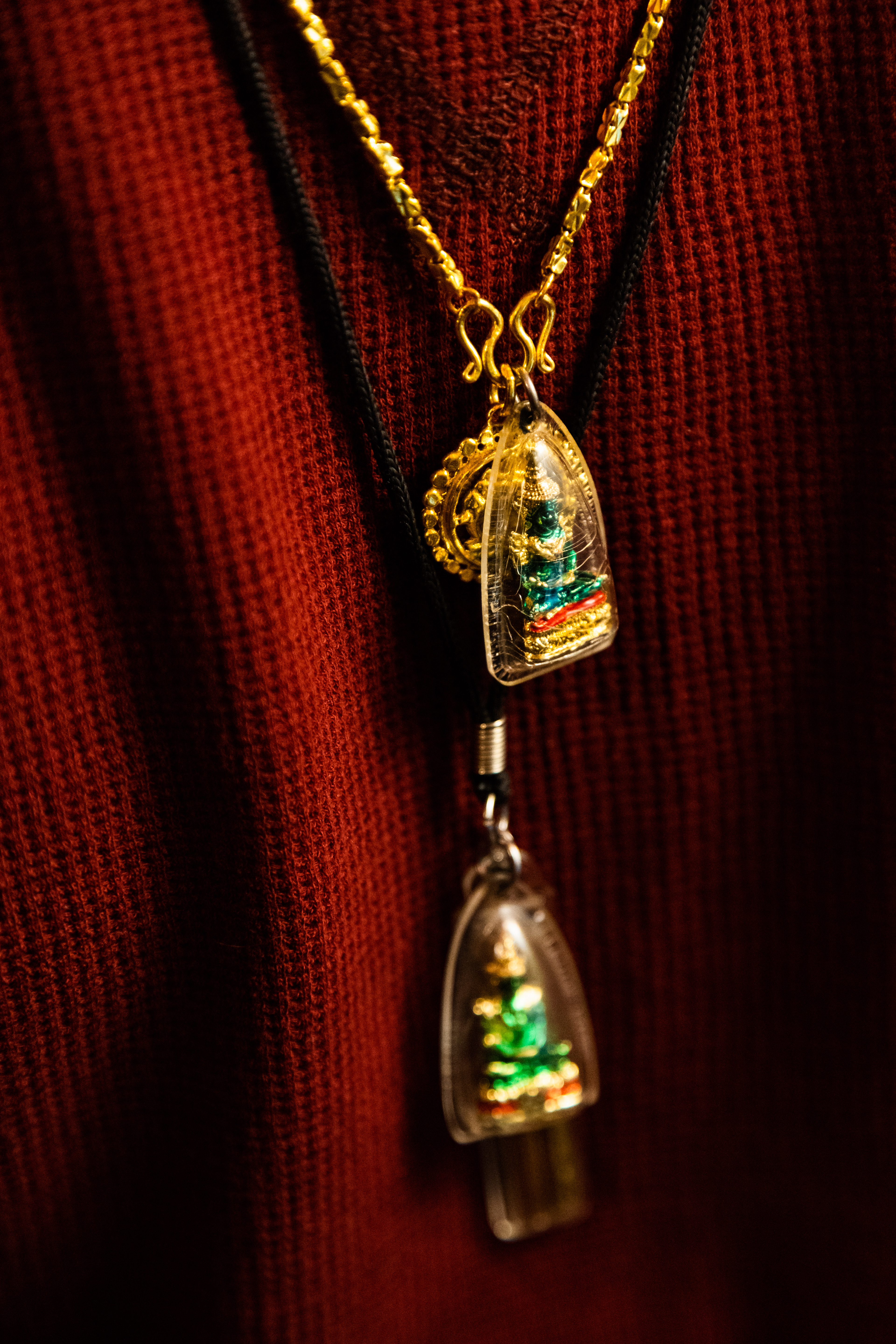
The storefront where Totero’s, an Italian restaurant, once operated sits empty at 2343 Mead St in Mount Pleasant, WI on April 23, 2021. The Laotian pop-up restaurant Sap-Sap is set to open their first permanent location here in 2021. (Photo by Brian Huynh)

The timeworn Totero’s sign, one of the final reminders of the once beloved local Italian staple, is pictured at 2343 Mead St in Mount Pleasant, WI on April 23, 2021. After 75 years of service, the Totero family closed its doors in 2014. In 2021, Sap-Sap hopes to bring life back to the building. (Photo by Brian Huynh)

A plastic bag plugs two holes in windows near an entrance to the old Totero’s building at 2343 Mead St in Mount Pleasant, WI on April 23, 2021. (Photo by Brian Huynh)

Whon Phrakousonh, a business partner involved in the Wisconsin-based Laotian food business, Sap-Sap, is pictured on April 14, 2021. (Photo by Brian Huynh)

Gold necklaces featuring replicas of the Emerald Buddha, an important religious figure in Laos, and a Takrut inscribed with prayers, hang from the neck of Whon Phrakousonh, a business partner involved in the Wisconsin-based Laotian food business Sap-Sap, on April 14, 2021 (Photo by Brian Huynh)
Laotian food business gives Wisconsin a history lesson and a meal
On the corner of Mead and 24th Street in Mount Pleasant, Wis., lies a timeworn building with a stained marquee reminding passersby that this was once the home of the beloved Italian restaurant Totero’s. From the chips in the cream colored imitation brick to the discolored plastic bag plugging two holes in a window near the entrance, it’s not hard to believe this building has been vacant for nearly 7 years.
It’s a humble location — oddly fitting for its new residents, Sap-Sap, a small Wisconsin-based Laotian food business that hopes to give the old restaurant at 2343 Mead St., the love and care it needs to become a community staple once again.
After six years of hosting pop-up dinners and fulfilling take-out orders at venues around the state, Sap-Sap is opening its first permanent location sometime in 2021 — in the middle of a pandemic, no less.
Over the past year, small businesses closing has become another cruel sign of the times. But Sap-Sap seems to be breaking the mold despite some setbacks early on when stay-at-home orders interrupted their residence at Crossroads Collective, a food hall on Milwaukee’s east side.
Retail products like their Laotian sausages, have been impacted the most by the pandemic and they are no longer available in Wisconsin supermarkets.
In retrospect, these turned out to be only minor inconveniences. In addition to the new location, they have continued selling meals, launched new beer and coffee ventures and they’ve invested more in philanthropy.
Inspired by its owner Alex Hanesakda’s experience growing up as a Laotian refugee in America, Sap-Sap’s mission is simple: build community, create understanding and share southeast Asian culture through food.
From humble beginnings, Sap-Sap is now growing in the unlikeliest of times and giving back to communities in a time of need.
Impact of Covid-19 on Small Businesses
Restaurants, especially those categorized as small businesses, struggled financially and socially during the beginning stages of the pandemic. Establishments that sell the experience of intimate community building had to come to terms with social distancing and mask mandates. Forbes reported that just two months of the pandemic saw 40% of America’s restaurants shuttered and 8 million restaurant industry workers unemployed.
“It goes back to the type of business you had,” Colleen Merrill, the Associate State Director of the Wisconsin Small Business Development Center, said. “If you were primarily takeout, you probably weren’t hurt as much because you were continuing to find ways to get your product out. If you were a dine-in restaurant, and the doors were closed, you struggled.”
Sap-Sap seemed perfectly made to handle the stressors of the pandemic. Without a physical location to tie them down and low overhead costs, they were able to weather the initial storm and get back to work quickly. They also stayed active on social media, something Merill believes made a big difference in small businesses that were able to stay open by pushing their products online.
“It was kind of an interesting process to adapt to it, but it was kind of already built into our infrastructure,” Whon Phrakousonh, a business partner of Hanesakda’s, said. “For the most part, we were able to seamlessly transition into working with Covid.”
Sap-Sap’s Roots
At its core, Sap-Sap, which translated from Lao means “delicious-delicious,” is about family. And though it officially opened for business in 2015, Sap-Sap’s origins are rooted much deeper in Alex Hanesakda’s life, to the people who first taught him how to cook.
“It definitely developed organically. I never had plans to be a chef or restaurateur, or open a restaurant or anything like that,” Hanesakda said. “It kind of took off after my father passed. Like, I started cooking more — just recreating his dishes. I think that might have been my way of coping with his passing.”
His father, Thongsing, fought alongside American soldiers as a member of the Royal Lao Army which inspires much of the work Sap-Sap now does with veterans, including a partnership with the Veterans Outreach of Wisconsin (VOW). In the future, Sap-Sap plans to launch Thongsing Meals, which will provide free food for veterans in his father’s honor.
The Hanesakdas left Laos as war refugees and found their new home in Burlington, Wis. Food linked them to their homeland while creating a space for them in a foreign country.
Whenever Alex recalls the story of Sap-Sap, he can’t forget to mention his other big influence — his mom, who used to make egg rolls to sell to their neighbors.
Her influence was so great that he named his first food business, and what is now the predecessor to Sap-Sap, Mamma’s Eggrolls.
For years, all he sold were egg rolls until his ambitions grew and Sap-Sap was born.
“I just had this idea to start pushing out more food and kind of telling our story and, you know, our assimilation to America through my mom's egg rolls. And that developed into Sap-Sap, because we wanted to do more products that were Lao and Southeast Asian driven.”
This led to the creation of Sap-Sap’s Laotian sausages that, in a pre-pandemic world, were sold in select retail stores across Wisconsin. It also gave him the platform to serve his customers more than just food, but a history lesson and cultural experience as well through pop-up dinner events that featured multiple course meals.
Social media has played an integral role in their continued growth according to Hanesakda. Facebook and Instagram are their sole forms of advertisement. Without any external marketing support, they amassed thousands of followers in their first few years of operation and it proved to be enough to completely fill seats at events. It has also kept them going during the pandemic where they have transitioned to take out and curbside delivery at various locations.
While the response has been mostly positive, Hanesakda says Sap-Sap does get critiqued on its authenticity. He promotes his food as authentic but emphasizes that it reflects his experiences growing up as a refugee in Wisconsin.
“We get s---, a lot of times, like we're not doing really authentic food. But you know, part of the refugee experience was like, eating traditional food, but also craving like that f------ pizza, you know, or cheese or whatever,” Hanesakda said. “So it was kind of like a hodgepodge of flavors from my parents’ kitchen and what I was growing up around in Wisconsin.”
Authentic or not, Sap-Sap’s dedication to Southeast Asian culture and history, particularly Laos and its stories of war and dispossession, is genuine. Hanesakda wants to share these stories through his food and he wants his impact to extend beyond the lives of his customers. He is trying to do this through his various philanthropic efforts like Thum Phuk, a sticky rice lager he created with Low Daily Brewery during the pandemic. He has partnered with the non-profit, We Help War Victims, to donate 5% of all profits made from the beer to help remove unexploded bombs in Laos — remnants of the American secret war that created thousands of Laotian refugees.
The Secret War
According to Legacies of War, an organization that works to spread awareness about the American involvement in Laos, the United States dropped upwards of two million tons of bombs on Laos between 1964 and 1973.
Because Laos neighbors Vietnam, the bombings were part of America’s larger campaign against communism during the Vietnam War. The collateral damage was swept under the rug by the CIA who took charge of the bombing campaigns in what is now called the Secret War where they also armed Laotian and Hmong soldiers to disrupt supplies and troops from entering Vietnam through the Ho Chi Minh Trail.
The impact of the war is still felt today in Laos, where thousands of unexploded bombs litter the land. They have killed and injured more than 20,000 people since America withdrew from the country according to Legacies of War.
Ian Baird, a geography professor at the University of Wisconsin-Madison who studies Southeast Asia, estimates that approximately 10% of the Lao population fled in the 1970s and 80s and because refugee camps in Thailand would not allow them to immigrate, they were sent to countries like France, Canada, Australia, New Zealand and primarily the United States where large populations have grown in Chicago and California.
Those in Laos who fought alongside the Americans during the Secret War, like Hanesakeda’s father, were not recognized as veterans in America and thus received no government benefits or support. He often speaks about his father’s struggles with PTSD as a driving force behind Sap-Sap’s philanthropy.
Hanesakda views his food as a means of education and a vehicle for empathy. He thinks many young people and Vietnam War veterans don’t have the full picture and hold all refugees under a negative light because they don’t understand that they were allies forced from their country because of American occupation.
Rather than fight those with prejudice through violence, Hanesakda argues that it’s far more effective to feed them.
“If you feed someone that's racist, or who has some stupid ideas of you because they don't know who you are, they have a tendency to have compassion back. Like, ‘Oh, wow, that was really nice. This guy's not a bad guy,’” Hanesakda said. “And that just opens up Pandora's box for like this whole rethinking for them.”
A Generational Divide
With any mass migration of people, younger generations tend to adopt the popular culture of their new home. For the Lao population in America, that has meant a loss of language and identity that inspired Akarath Soukhaphon, a Laotian American and Hanesakda’s friend, to start Luk Lao Laan Lao, a program that teaches students Laotian dances and music.
He acknowledged the difficulties his parents must have faced in simultaneously resettling and preserving their culture.
“When our parents first resettled, I don’t think that was on their mind, that trying to maintain these cultural rituals and language” Soukhaphon said.
“But I think with the 1.5, the second generation, which I’m a part of, we can still kind of act as a bridge,” he added.
Hanesakda views Sap-Sap as an opportunity to pass on and preserve their traditions and stories. He recognizes that these losses are natural for those growing up in America but, if nothing more, he wants future generations to keep the spirit of community and generosity alive and to learn as much as they can about their history.
When he was able to host in-person events, he made his dinners a cultural experience where people ate communally at large tables and he encouraged his guests to dig into the sticky rice with their hands — a practice taboo in America, but normal in most Southeast Asian countries.
He paired food with traditional art provided by Soukhaphon, who says they have similar hopes for the Lao community though their methods may differ.
Together, Soukhaphon believes they can pass on the most important parts of their identities to the generations that follow.
“Through my music and dance program and through Alex's food, we can talk about the war, we can talk about migration and displacement and resettlement and tell people that, you know, Laos is still there,” Soukhaphon said. “It's still recovering from war and the more eyes and ears that we can get on Laos, we can help kind of alleviate some of the legacies of that war.”
Forward
Industry analysts could remove Sap-Sap’s convenient business model from the pandemic equation, but the Laotian restaurant would likely continue to thrive. Both Phrakousonh and Hanesakda believe its success stems from authenticity and ability to build cross-cultural communities.
Wider audiences have taken notice. People have traveled from as far as Chicago to get a taste of Sap-Sap and news outlets across Wisconsin have covered their story.
Their first permanent location is the next phase of their mission to share Southeast Asian stories and build community through food. Though Hanesakda hoped to open earlier in the year, the restaurant is ready to start serving customers as soon as it passes inspection.
Despite a pandemic and his success in such an unlikely time, he remains ambitious. In Hanesakda’s eyes, this is just the beginning for Sap-Sap.
Written for Journalism 335: Principles and Practices of Reporting. Unpublished